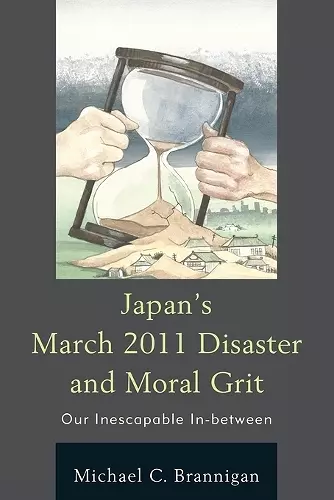Japan's March 2011 Disaster and Moral Grit
Our Inescapable In-between
Format:Paperback
Publisher:Lexington Books
Published:3rd Apr '17
Currently unavailable, and unfortunately no date known when it will be back

Japan’s March 11, 2011 triple horror of earthquake, tsunami, and nuclear meltdown is its worst catastrophe since Hiroshima and Nagasaki. Recovery remains an ongoing ordeal. Japan's Responses to the March 2011 Disaster: Our Inescapable In-between uncovers the pivotal role of longstanding cultural worldviews and their impact on responses to this gut-wrenching disaster. Through unpacking the pivotal notion in Japanese ethics of aidagara, or “in-betweenness,” it offers testament to a deep-rooted sense of community. Accounts from survivors, victims’ families, key city officials, and volunteers reveal a remarkable fiber of moral grit and resilience that sustains Japan’s common struggle to rally and carve a future with promise and hope. Calamities snatch us out of the mundane and throw us into the intensity of the moment. They challenge our moral fiber. Trauma, individual and collective, is the uninvited litmus test of character, personal and social. Ultimately, whether a society rightfully recovers from disaster has to do with its degree of connectedness, the embodied physical, interpersonal, face-to-face engagement we have with each other. As these stories bring to light, along with Michael Brannigan’s extensive research, personal encounters with survivors, and experience as a volunteer in Japan’s stricken areas, our degree of connectedness determines how we in the long run weather the storm, whether the storm is natural, technological, or human. Ultimately, it illustrates that how we respond to and recover after the storm hinges upon how we are with each other before the storm.
This intensely moving account not only teaches us invaluable lessons regarding our societal ability to respond to disaster but, in providing extraordinary insights into the meaning of vulnerability and suffering, it also demonstrates the absolute necessity of cultivating interpersonal face-to-face connectedness and community in order to heal—a lesson that is particularly important in our individualistic, technology-saturated, digital culture. -- S. Kay Toombs, Baylor University
With this engaging book, Brannigan keeps a promise he made to his late Japanese mother—to learn more about the disasters of 3/11 and to share this with others. Brannigan effortlessly interweaves stories from the people he meets with his own rich knowledge of literature, legends, history, and philosophy to develop a philosophy of human's relation with nature. This book is not always optimistic, but always reveals Brannigan’s warmth and genuine concern for the people he encounters. -- Brigitte Steger, University of Cambridge
In this pioneering work, Brannigan opens wide the doors on a previously understudied subject in the humanities and social sciences—disaster, trauma, and recovery. A rich and rewarding read for anyone interested in ethics and philosophy, this book is a must for all concerned with disaster preparedness and response, victimhood, grief management, mental health, medical ethics, and public policy, as well as Japanese and cultural studies. -- Robert Paul Churchill, Elton Professor of Philosophy, George Washington University
ISBN: 9780739196700
Dimensions: 231mm x 149mm x 18mm
Weight: 367g
238 pages